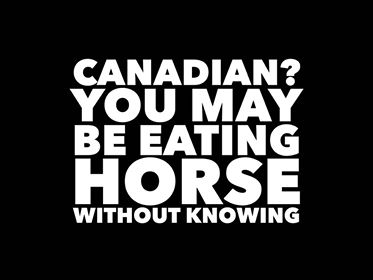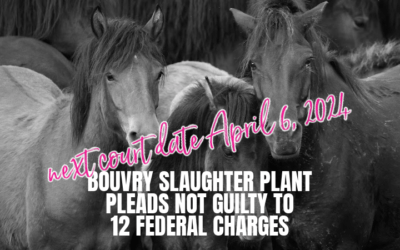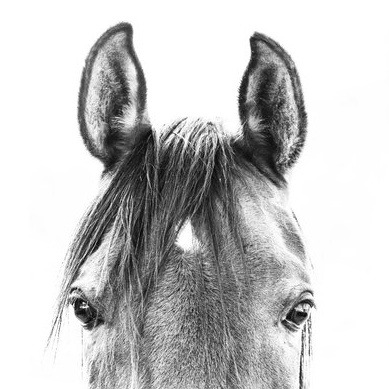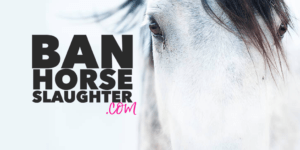This blog post is worthy of a re-post. You may also be interested in Happy Canada (Slaughters Horses) Day as well.
Why aren’t Canadian food inspectors surprised there’s horse meat in YOUR sausages?
Beware, summer BBQ-ers: there could be horse meat in your pork sausage. Or pork in your beef sausage. Or beef in your chicken sausage. Or chicken (and only chicken) in your turkey sausage.
Those are some of the examples cited in a new study from researchers at the University of Guelph, which found 20 per cent of sausages sampled from Canadian grocery stores contained meats that were not on the label. The study was commissioned by the Canadian Food Inspection Agency, which, according to the Canadian Press, was “not surprised” by the results.
Read the full story in Maclean’s https://www.macleans.ca/news/canada/should-you-be-surprised-if-theres-horse-meat-in-your-pork-sausage/
CBC: 1 in 5 sausages tested across Canada contains different meat than labelled
Scientist calls degree of off-label ingredients alarming.
A federally funded study has found that 20 per cent of sausages sampled from grocery stores across Canada contained meats that weren’t on the label.
The study, published this week in the journal Food Control, was conducted by researchers at the University of Guelph and commissioned by the Canadian Food Inspection Agency.
It examined 100 sausages that were labelled as containing just one ingredient — beef, pork, chicken or turkey.
“About one in five of the sausages we tested had some off-label ingredients in them, which is alarming,” said Robert Hanner, lead author of the study and an associate professor with the Biodiversity Institute of Ontario at the University of Guelph.
CTV: Horse meat found in sausages at grocery stores across Canada
A study commissioned by the Canadian Food Inspection Agency has found that some sausages contain meats that isn’t listed on the label.
Researchers from the University of Guelph examined 100 sausages from grocery stores across Canada and found that one-in-five contained off-label ingredients, including horse meat.
Seven of 27 beef sausages examined in the study contained pork and one of 38 supposedly pure pork sausages contained horse meat.
Of 20 chicken sausages, four contained turkey and one had beef while five of the 15 turkey sausages studied contained no turkey at all — just chicken.
Lead study author Robert Hanner calls the results alarming.
He says researchers found that while beef sausages predominantly contain beef, some also have pork, which he says be of concern for kosher and halal consumers.
The food inspection agency says it’s not surprised about Hanner’s findings, but cautioned the study is small and it’s considering more research.
Read the full story at CTV.
TORONTO SUN: The mystery meat behind your sausage. Worried about the MANE ingredient?
A research team at University of Guelph pulled back the casing to find that products labelled as purely one meat — beef, pork, chicken or turkey — often contained other ingredients, including horse.
Associate Prof. Robert Hanner, of Guelph’s integrative biology department, said they’ve developed DNA-based methods to identify species — technology that’s been used in the past to expose global-level fraud in the seafood industry.
The Canadian Food Inspection Agency, in the wake of Europe’s horse meat scandal of 2013, wanted to know if the university’s researchers could do similar work for mixed meat, he said.
A deeper dive into grocery store sausage found that 20% of the samples — all labelled as containing one type of meat — actually were a mix.
Some “all-beef” sausages included pork, turkey sausages were made out of less-expensive ground chicken, and one pork sausage was mixed with horse meat.
Researchers didn’t look at other types of meat, but it’s possible that bison, lamb or other species might have made their way into the sausages, Hanner said.
“Our labelling laws require you to put what’s in the product on the label,” said Hanner. “For me, this just points to some gaps in our traceability system that some of this off-label meat is getting through.”
In a time of global supply chains, it’s even more important to be able to track down where this cross-species contamination might be happening, he said.
A consumer might have an allergy to one type of meat, and there are Kosher and Halal considerations.
“If this is happening farther up the supply chain, where some of their suppliers aren’t declaring what’s in there, could it be because some of this meat is unfit for human consumption?” Hanner said. “And that’s where I kind of worry — why isn’t it on the label?”
For instance, Brazil is in the midst of a food processing scandal where it’s alleged companies paid off inspectors to allow the use rotting meat.
Hanner said DNA technology offers an opportunity for Canada to become a world leader in offering safe and reliable food.
Sylvain Charlebois, professor of food distribution and policy at Dalhousie University, said processed meat and seafood are the most likely candidates for food fraud.
“With fish and seafood, there’s a huge mess there. It’s probably the worst category,” Charlebois said. “We did a study a few months ago and fish and seafood is by far the most problematic food category when it comes to food fraud because there are so many species, so much confusion.”
In Canada, 25% to 75% of fish could be mislabelled, he said.
As for sausages, Charlebois said he’s surprised the amount of unidentified meat was so low — in some parts of Europe, upwards of 50% of sausages contain mystery meat.
That doesn’t mean this is nothing to worry about though, he noted.
“Particularly for those who make dietary decisions based on faith. If you actually are buying a sausage with pork in it, and you’re from the Jewish faith or you’re a Muslim, that’s quite problematic. It doesn’t matter if it’s 25% or 100% — you’re misleading the public and therefore it’s fraud.”
Other common forms of food fraud are products that are labelled organic or local, Charlebois said.
Two high-profile Ontario cases involved grown-in-Mexico “local” tomatoes and falsely-labelled Kosher cheese.
Within 10-20 years, consumers should be able to access affordable devices either in their homes or at their local stores that can confirm the contents, Charlebois predicted.
Food regulators in Canada are also growing increasingly confident about pursuing bad apples, he said.
“As you see more and more fines, industry will actually clean up its act.”
Read the full story on the Toronto Sun website.

So why is eating horse meat any different than eating any other kind of meat?
That’s a great question.
One of the first concerns is that most of the horses slaughtered within Canada for human consumption, whether butchered and shipped to other markets or consumed within Canadian borders have not been raised for specifically for meat.
Horses that have been raced, or are considered pet horses are routinely slaughtered. Most horses that fit these categories will have been treated with wormers at least twice per year, wormers that have very clear protocols about their use on livestock entering the human food chain.
They may also have been treated with a drug commonly known as bute, that is administered for a wide range of ailments in horses, everything from arthritis to hoof abscesses and so much more.
Ask any horse owner they’ll be able to tell you all about how often they worm their horse and experience with bute.
But surely there’s paper work to be presented before a horse is slaughtered in Canada – right?
Well, you are absolutely right but that paperwork is on the honour system.
Do you want to trust your health to a system that is based on the honour system, especially when there have been cases where stolen horses have been slaughtered?

T-SHIRTS IN SUPPORT OF HORSE RESCUE FUND
LIMITED TIME OFFER FREE SHIPPING CANADA & USA
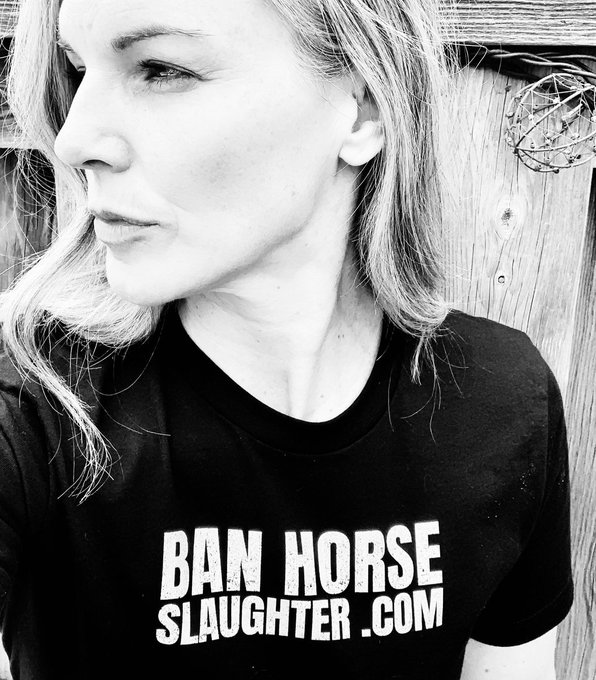
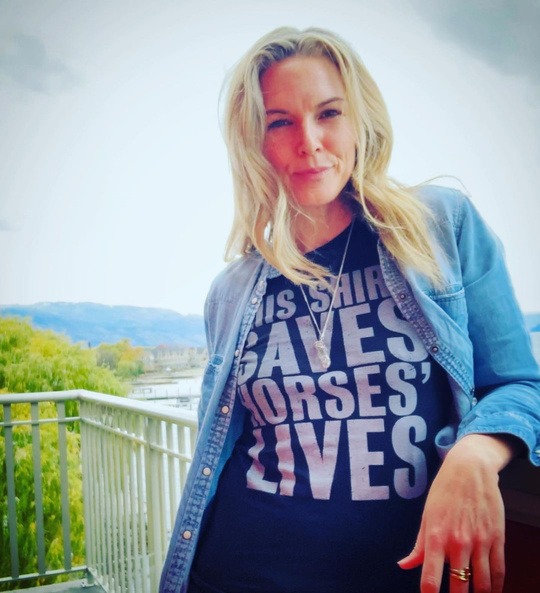
CANADA SLAUGHTERS HORSES FOR HUMAN CONSUMPTION
It may be hard for some to believe that tens of thousands of horses, including pets, are routinely slaughtered in Canada, for human consumption.
Some of the meat is consumed in Canada and much of it is shipped to the European Union and other markets, including Japan.
The barbaric slaughter of horses is currently not legal in the United States, BUT horses, including pets and ex-racehorses, from the United States are shipped to Canada and to Mexico to be slaughtered.
In addition Canada allows for the transportation of live horses to Japan, to be slaughtered for human consumption, and unfortunately the transportation of horses destined for slaughter within Canada, and by air, is far from humane.
APRIL 9, 2024 BOUVRY SLAUGHTERED HORSES
AND HERE WE GO AGAIN... April 9, 2024: We continue to hear that Bouvry in Fort MacLeod has closed. That rumour, a misinterpretation of a post by a well known and much respected by us group persists. The main FEEDLOT - which is a seperate property from where the...
BOUVRY UPDATE
THE MAIN FEED LOT AT BOUVRY UPDATED MARCH 30, 2024: The main FEEDLOT belonging to the Bouvry slaughter plant in Fort MacLeod, Alberta, Canada -- which for years has been used to fatten up horses before slaughter -- has been empty for some months now. BUT horse...
12 CHARGES LAID AGAINST BOUVRY
FIRST PUBLISHED SEPT. 8, 2023 UPDATED APRIL 4, 2024From the Canadian Food Inspection Agency (CFIA) website. All of the following 12 charges are related to activities of Bouvry Exports Calgary Ltd. that occurred in July 2021. The accused party appeared in court in Fort...

